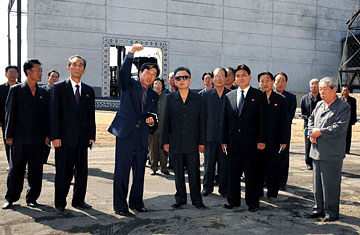
An undated picture, released from North Korea's official Korean Central News Agency on September 5, 2009, of North Korean leader Kim Jong-Il at the Songjin Steel Complex in Hamgyongpukdo province
After nine months of nuclear and long-range missile tests, the detention of two American journalists, and a barrage of hostile rhetoric, Kim Jong Il now has the U.S. right where he has wanted it all along — ready to sit across the bargaining table, one on one. The Obama administration said late last week it is willing to negotiate directly with Pyongyang, if only, in the words of State Department spokesman PJ Crowley, to get back to the six-party format invented during the George W. Bush administration.
That's unlikely to happen. Pyongyang has said it has no interest in ever returning to the six-party negotiations in which the U.S. enlisted South Korea, Japan, China and Russia as its negotiating partners. Pyongyang has always wanted to deal directly with Washington, as it did in 1994 when it negotiated the so-called "Agreed Framework" with the Clinton administration — the first instance in which Pyongyang agreed to stop work on its nuclear program. Kim has always wanted to deal with the biggest dog on the block, both for reasons of international prestige (see the former pariah now sitting down with the world foremost power), as well as to marginalize its neighbors South Korea and Japan. From North Korea's perspective, Obama's willingness to sit down directly is already a diplomatic victory of sorts.
Now comes the hard part. What, exactly, does the U.S. talk to North Korea about, and in what order? Other than acceding to the direct talks — which the Administration had hinted upon taking office that it was amenable to — it has hit the same notes that the Bush administration did. Only after a verifiable disabling of Pyongyang's nuclear program — in return for economic and energy assistance, both part of the 1994 agreement — would it move on to discussions about "normalizing relations." Diplomatic sources in east Asia say the U.S., in concert with its allies, is now talking about exactly what to put on the table, and in what order, in return for a verifiable halt of the North's nuclear program. For instance, if the North shuts down its production of nuclear weapons, but doesn't yet agree to give up the bombs it has already produced, what, if anything does it get from the U.S? This is the kind of question facing Washington now, sources say. "There is a robust discussion going on in Washington and with U.S. allies about how to approach this opportunity, but I can't say anything is settled yet," says one east Asian diplomat.
Since the U.S. started negotiating with North Korea over 15 years ago, hawks and doves within succeeding administrations have always wrangled over a central dilemma: Are the North Koreans bribeable? That is, are there sufficient economic as well as diplomatic incentives available to get the North to give up its nuclear program for good? A recent policy paper from the Asia Society and the University of California that has circulated in Washington discusses the ways in which "the economic dimension" can "induce and reinforce the peaceful transformation of the DPRK into a country that can provide adequate livelihood for its people and engage with other countries in a non-hostile manner." Hawks, on the other hand, view the notion that the U.S. can "induce" the North Koreans to abandon its nuclear program as naïve — "a tired siren song," in the words of Bruce Klingner, a Senior Research Fellow at Washington's Heritage Foundation and a former CIA analyst. Doves say the 1994 Agreed Framework is evidence that the `carrot' option can work. Hawks say the North began undermining and cheating on that agreement before the ink was dry.
The Obama administration is studded with people inclined to believe carrots like energy and food aid can work, in return for verifiable steps toward an eventual nuclear stand-down. There is, however, one enormous material fact on the ground that has changed since the North first agreed to stop developing nukes in 1994: it now has several nuclear weapons, made via its plutonium program in interim years, and recently admitted that it's close to having a bomb triggered by highly enriched uranium as well. (Indeed, North Korean refugee groups in Seoul have recently been circulating reports — impossible to verify, of course — that the North plans a uranium bomb test this autumn.) The Administration will no doubt give negotiations the old college try, one on one, just like Pyongyang wants. But assuming the North is bribeable — and that's a huge assumption — its price for doing a deal now, as the east Asia diplomat acknowledges glumly, "will have gone way, way up."
